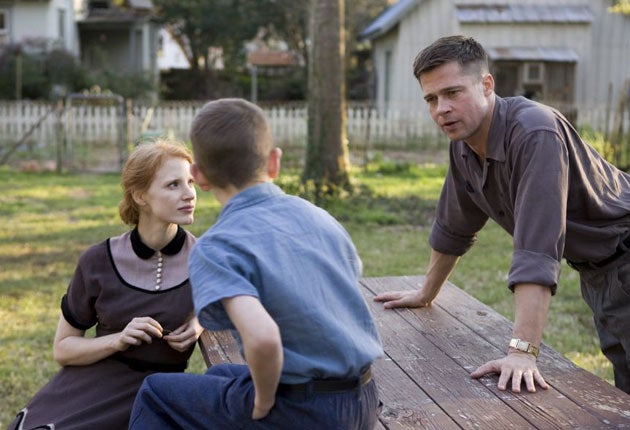First Night: The Tree Of Life, Cannes International Film Festival
Malick pursues his vision in a lyrical, baffling tour de force

You have to admire Terrence Malick's cussedness and perversity. No other major American filmmaker, not even Stanley Kubrick at his most wilful, has ever made a film quite as idiosyncratic as The Tree Of Life. This is a two-hour experimental movie that could just as easily be seen in a gallery as in a cinema. Full of interior monologues, flashbacks and flash-forwards, it is lyrical, mystical, awe-inspiring – and often quite baffling.
Predictably, the reaction after yesterday's packed press screening was sharply divided. There were some catcalls and whistles as well as smatterings of applause. Malick is known to be in Cannes but, true to form, he wasn't at the press conference (or, if he was there, he was incognito).
Actors relish working with Malick and are ready to make huge sacrifices on his behalf. It was striking how protective the film's stars, Brad Pitt and Sean Penn, sounded about the director at yesterday's press conference. Pitt defended Malick's no-show, making the point that he was an artist, not a real estate salesman who had to hawk his wares in public. Nonetheless, Malick is not the type to provide grandstanding speeches or showy pieces of business.
The opening half-hour of his film plays like a big-screen version of Wonders Of The Universe or The Blue Planet (but with no sign of Brian Cox or David Attenborough to guide us through). A family in small-town Texas is mourning the death of a 19-year-old son in a war (presumably Vietnam, although that is never specified).
Their grief is the catalyst for prolonged sequences of the galaxy and the natural world. We see dinosaurs yomping through the undergrowth, stars exploding, imagery of sea animals and of forests and skyscapes, as well as the miracle of birth. With all due modesty, Malick (aided by the visual effects supremo and former Kubrick collaborator Douglas Trumbull) sets out to show us nothing less than the formation of our planet. Booming classical music plays on the soundtrack (the film's structure is self-consciously symphonic).
Gradually, after this spectacular overture, the filmmaking settles down. In contemporary scenes, we see Jack O'Brien (Penn), who appears to be an architect, in his modernist office, agonising over the loss of his brother many years before.
Then we're whisked back to Waco, Texas, in the 1950s. Jack's martinet father (Pitt) and his beautiful but fragile wife (Jessica Chastain) are bringing up their three sons. O'Brien Snr is a contradictory figure: a disciplinarian with close-cropped hair who makes his kids sit up at table and smacks them when they step out of line. He is strictly religious. At the same time he loves music and appears to be a frustrated artist. He has a humdrum job and the only magic in his life comes from the kids he treats so severely.
Pitt gives a restrained and affecting performance as a small-town everyman who hasn't fulfilled his life's dreams. Close-cropped and a little paunchy, this is the star a long way removed from his usual matinee idol roles. He is a man capable of brutality toward his family, but Pitt conveys effectively his wistfulness and tenderness as well.
The storytelling is fragmentary and impressionistic. Cinematographer Emmanuel Lubezki's handheld camerawork and constant reframing adds to the jarring quality, as does the often abrupt editing. Throughout, Malick seems as interested in the natural world as in his human protagonists. He chronicles key moments in the sons' development with a near anthropological relish: the moment a baby recognises himself in the mirror, a strange sequence in which Jack steals his mother's negligee and buries it beside a river.

Watch Apple TV+ free for 7 day
New subscribers only. £8.99/mo. after free trial. Plan auto-renews until cancelled.
ADVERTISEMENT. If you sign up to this service we will earn commission. This revenue helps to fund journalism across The Independent.

Watch Apple TV+ free for 7 day
New subscribers only. £8.99/mo. after free trial. Plan auto-renews until cancelled.
ADVERTISEMENT. If you sign up to this service we will earn commission. This revenue helps to fund journalism across The Independent.
This may be 1950s small town America, but not as we usually know it. The O'Briens live a spartan life. They don't watch TV. Elvis Presley, Marlon Brando and the youth rebellion have no place in their world. Nor are they in thrall to consumerism. The film eschews humour and irony. There are no high school proms or clichéd observations about germ-filled adolescence.
Malick's movies always have their self-consciously lyrical moments. Critics still rhapsodise about the scenes in which the locusts ravage the crops in Days Of Heaven, or of the beautiful Midwestern landscapes in Badlands.
The difference with The Tree Of Life – and what makes it such an unusual film – is that it is comprised almost entirely of grace notes. Every frame of every sequence has been lovingly pored over and could stand as a still image in its own right. Audiences looking for a conventional narrative and drawn by the star power of Penn (who appears only briefly) and Pitt will be absolutely flummoxed by it.
Malick's film is unlike any other in competition in Cannes this year. It's more of a poetic meditation than a multiplex box-office draw. Accept it on its own terms, though, and it's quite a trip.
Join our commenting forum
Join thought-provoking conversations, follow other Independent readers and see their replies
Comments